- Home
- Trevor Scott
Fatal Network Page 14
Fatal Network Read online
Page 14
She thought for a second. "Not too good. He had a heart attack just before Christmas and hasn't returned to work yet. I'm not sure he will."
"Shit...Cecil. He was in good shape. He's one of the last old school guys."
"Yeah," she said. "That's why we're so shorthanded down here. To top it off, John was transferred to the Middle East on short notice in November and we don't expect a replacement anytime soon. I told him to lose the Arabic, but he wouldn't listen."
Jake shook his head. He felt nervous. He looked at his watch and around the room again. Finally, he set his gaze on the pillow and blankets.
"Let me explain those. I have a guest who is working on this case with me."
"The guy who answered the phone when I called from Germany."
"Yes. His name is Kurt Lamar. He's an ensign with the Naval Investigative Service. He was assigned aboard the USS Roosevelt to find out how computer chips were being pilfered from an important avionics upgrade to the A-7. It turns out a couple of technicians were working with a pilot who carried them onboard his A-7 and then diverted to shore complaining of some inflight emergency. We know the pilot made a drop at Camp Darby, but we're not sure who he sold the stuff to."
"That's similar to what was going on in Germany. Only the guy ripping off the chips was a tech rep for Teredata's F-15 avionics upgrade. My guy was clonked over the head and thrown into the Rhine. They just found him a few days ago."
Toni looked surprised. "This is crazy, Jake. The pilot we interrogated was blown up in the Genoa attack last week. I'm sure you heard about it."
"I haven't been listening to the news for the last week. I've been spending most of my evenings watching the guys who killed the tech rep."
"Four sailors were killed with a remote control car loaded with plastics. Kurt had two of the four figured out, and our pilot gave us the names of the others."
"Not without your patented persuasion I'll bet," he said smiling.
Toni shrugged her shoulders. "Well? I can't help it if people try to keep secrets. Do you think the bad guys would do any less?"
"No."
"See!"
Jake felt a shiver come over him, bringing goose bumps to his arms. The long drive with no sleep must have been catching up with him. "I hate to get back to business, but I really need some sleep. I need to talk through some of this case though. You don't think that these cases are unrelated do you?"
"No. But why haven't our Agency guys in Germany contacted me yet?"
"Because I haven't told them shit. You're the only American official notified so far."
"Pride runs deep with you, doesn't it?"
"It's not just that. I don't trust those bastards. Besides, I'm working for Teredata. The company has an obligation to report lost technology, but only after they're sure it's going to a foreign government. I'm still not sure that's the case. I'm a corporate investigator. I believe this transfer has more to do with economics than politics or national security. If I find out differently, then naturally I'll report it...in due time. Like I said though, I think this is corporate espionage."
"I think you're right, Jake, but when do we draw the line between national security and a foreign company's will and desire to become more competitive?"
"I don't want to philosophize over this, Toni," Jake said as he rubbed his eyes and then stroked his fingers through his hair. It was a legitimate question. Justifying his right to remain autonomous hadn't even been a consideration in Germany. He had asked Milt Swenson if the government was aware of the technology transfer. When Milt said no, Jake hadn't even questioned his intent. He knew that the last thing any government contractor wanted was the slightest appearance of impropriety. Future contracts relied on the performance of those currently in place.
"How serious was the transfer in Germany?"
"It depends on your perspective of damage," Jake said sarcastically. "I know you're not really into computers, but I'll try to explain the problem. The chips alone are important. More so, though, is what you do with them. This is the fastest chip currently in production, and probably the fastest that anyone could expect to come out with in the foreseeable future. So they are important."
Jake paused for a second contemplating how to explain the technical details.
"So, is this technology restricted for transfer to NATO countries?"
"Currently, yes."
"Are they the same as the chips on the A-7 contract?"
"No! They're similar."
"But...."
"Wait a minute. Let me explain further. Like I said, these chips are important. Put them in your normal PC and you've got one hell of a fast computer that can out perform anything currently on the market. And that's what Teredata plans on using them for, eventually. The German company that acquired them, Bundenbach Electronics, will probably use them for that purpose...and maybe more."
"Like what?" she asked, uncrossing her legs and moving closer to Jake on the sofa.
Jake felt the shiver again. He didn't know this time if it was caused by his lack of sleep, or what he was about to reveal to Toni. "Have you ever heard of transputer technology?"
She shook her head back and forth.
"Well, it's the greatest advance the Europeans have ever made in computer technology. It's a series of chips linked in parallel sequence that integrate speed, power and communications into the fastest microprocessor ever produced at unbelievably low prices. It's turning America's best supercomputers into relics."
"Why do the Europeans need these chips then?"
"They don't , if they want to produce a half-assed computer. If they combine a bunch of these transputer chips in parallel, they come up with the fastest computer on the market. But the technology isn't perfect. It takes some complex and sophisticated software to make the big machines work at peak performance. The Americans are the world's software wizards. Also, the transputer chips lack memory direction. In other words, when a bunch of people try to use the computer at one time, the computer gets confused. It can mess up someone else's work in a heart beat."
"How will the Teredata chips help that?"
Jake got up from the sofa and walked to the window overlooking the courtyard garden. The fading moon cast a ray of light over the upper portion of the building across the square. He turned and sat against the edge of the marble sill, and crossed his legs and arms.
"The Teredata chips combined with the transputer chips would give you the perfect computing system. Speed, power, everything. And, the system would be economical. On a small scale, you could make a personal computer microprocessor about one fourth the current size with about fifty times the processing speed. On a large scale...I don't even want to think about that."
She rose from the sofa and came over to the window. "I think we have a problem." She looked out the window and placed her hands over the warmth rising from the radiator beneath the marble sill. "Kurt found out something interesting last night. In fact, he just got back a few hours ago. That's why he's sleeping in my bed instead of the sofa as normal. I knew you'd be here this morning."
"What's the problem?"
"I told you we interrogated the Navy pilot. Well, we found a telephone number on him. We traced the number to the U.S. Department of Commerce in Rome."
"Commerce? What in the hell are they doing in Rome?"
"That's the first question we asked. We found out they were chartered by Congress to help U.S. businesses currently operating in Europe, and to give technical assistance to East European countries with emerging market-based economies."
Jake rubbed the thick black stubble on his face. "I can understand the first part. American businesses are going to be at a disadvantage when the European Economic Community gets its shit together. The U.S. companies need to get their butts in gear if they plan on staying competitive. But why would they want to push to help the East European countries?"
"Kurt and I have been thinking about that. We think that the U.S. government may be looking at those countries as
a cheaper labor force and an eventual market for goods. That is once they get their economies straightened out."
Jake placed his hands over the warm radiator. "That makes sense. But what did the pilot have to do with the Commerce Department?"
"That's the problem. We think we have a rogue in the department. Kurt followed Jason Dalton, the second in charge of the Rome office, to Trieste last night. Dalton dropped off something with at least two guys aboard a fishing boat. We think that Dalton was the contact for the pilot and his men and is transferring the chips to some other country."
"I see. If he made the drop here in Rome then perhaps he would be selling to a company in Italy. But he's transferring in Trieste, which is more like a Slovenian port than Italian."
"Exactly! I see your time in the private sector hasn't dulled your reasoning," Toni said.
"Ha...Ha." A shiver came over Jake again. This time he was afraid he shook visibly. He had to sleep. But more than that, he had to digest the essence of this case. It had become an enigma; two fold from what he had just left in Germany. His case there wasn't complete, yet he had this new case to work as well. It was comforting to have Toni here, and Herb would keep things moving in Germany while he was away. But how did they relate to one another, or were they even related? He'd need sleep to determine that.
"What are you thinking, Jake?"
"I'm thinking if I don't get some sleep I'm going to drop."
"The sofa is yours," she said stroking her arm slowly toward the makeshift bed.
He didn't need any further convincing. He swaggered over, plopped down on the sofa, and curled up his legs to fit on the short couch.
In a few minutes, Toni came over to the sofa and looked at Jake. She unhooked his gun from the shoulder holster and set it on the coffee table. Then she covered him with the blanket and straightened it over his body. She sat down in the chair next to the sofa and watched him sleep.
* * *
CHAPTER 27
VARAZDIN, CROATIA
The pale morning sun seeped through the lead glass outer windows of the great foyer picture window casting elongated diamonds across the burgundy Persian rug.
Isaac Lebovitz hesitated briefly at a small wooden table to smell a grand bouquet of tiny red roses. It was but a small example of what would come, he thought. The beauty and fragrance of a San Remo villa would embrace him with pleasure, and bring tears to his eyes each and every morning. Tears of joy, not despair.
With the creak of the stairway behind him, Isaac turned. Vitaly Urbadic, his most trusted agent, made his way down the rest of the stairs slowly, and stopped to look out to the overgrown front garden. His tired, wrinkled eyes revealed the reality of his forty years, and the long nights and constant travel. Yet, his muscular chest bulged his tight black shirt almost as it had when he was an eighteen-year old Olympic hopeful. Only a knee injury had stopped his running career. And his twenty years with Hungarian Intelligence had kept him out of the factories.
"It's a jungle out there," Vitaly quipped.
Isaac moved over and opened the door to his large study. "I know you must be tired from the long trip last night," he said. "But I have to hear what you've learned."
Vitaly stretched his arms high above his head and yawned. "All right. But I thought we could at least make time for coffee."
"The maid will take care of that. Come, have a seat. You may be young, but time will eventually catch up to you as it has me. And then watch out. You won't be able to run around the continent from Germany to Italy and back to Croatia without a great deal of discomfort."
"The discomfort has already arrived, Isaac," he said.
"Greater discomfort than fatigue."
Vitaly sat in the chair opposite Isaac's desk.
"Did you get enough sleep?" Isaac asked.
"I guess."
Isaac tapped the side of his forehead with his index finger in time with the clock on his desk. "What did you find out?" he asked.
Vitaly shifted in his chair. "Dalton is a shrewd man."
"Besides that," Isaac said, becoming more impatient.
"He signed the contract. I countersigned to the right of your signature as you requested. He had another guy with him. I think an attorney. He had that distinguished and arrogant air to him, yet shifty eyes. His investors were eager to close the deal, so we can go forward with the plan."
"Was the money transferred?" Isaac asked directly, realizing his question was more like an accusation.
Vitaly hesitated. "Yes. In the Swiss account."
"Excellent! Things are moving ahead even faster than expected. I don't want to wait for Budapest to get off its ass. I could die of old age before that happens."
"What other choice do we have?" Vitaly asked.
Isaac rose from his chair and walked over to the window overlooking the overgrown side garden that scaled the side of the high brick outer wall. The wall had once kept the poor from peering inward, and the gentry from seeing those less fortunate. Perhaps he could move forward faster, he thought. The money was in place. The technology acquired. Why not? He turned toward Vitaly.
"We have another choice, Vitaly," he said smiling. "We can shift our first project to Germany. I know...I know, that was supposed to come later. But Germany is moving much faster than Hungary. Rudolf said his company would be ready in six months. That would give his engineers plenty of time to convert the production line."
"But...will Rudolf's workers stay?"
Isaac sat down once again and tapped his forehead. "Yes," he said softly. "They must. They are loyal to Rudolf. He said that he has only lost a few workers to the West. Other companies have lost up to fifty percent. Production has nearly come to a standstill some places. We could start training Rudolf's workers now, and in a few months, be ready for full production. Rudolf said six months not knowing that the money would be available this soon. I'm sure that he could push for an earlier production date."
"But what about marketing?" Vitaly asked.
"Dalton's strategy will help us out there as well. We should be able to keep labor and production costs down. We'll pump our products out to Western Europe and America at a reasonable price and great profit for us. Then, we'll be established to exploit Eastern Europe also."
Vitaly smiled broadly. "It sounds like we can't fail."
"We can't fail!" Isaac emphasized. "The chips Dalton has given us are the fastest available. Combine those with the information we are obtaining in Germany, and we'll have the most advanced product on the market at the cheapest price. They'll sell like ice cream on a hot day."
Without knocking, the maid came in with coffee and an assortment of bread, cheese and meats. She nodded to Isaac, and slowly limped out without saying a word.
Isaac motioned for Vitaly to help himself, and then got up to leave the room. "I'll be back in a minute."
Out in the foyer, the sun had intensified allowing the visibility of dust particles in its beams. Isaac met a tall man in a dark black suit. The man's eyes stared coldly at Isaac without blinking. His cratered face and steel jaw looked like a Greek statue that had succumbed to acid rain. His large hands were thick and strong. He still had his black felt hat on.
Isaac looked into the man's eyes sternly and then turned and walked toward the kitchen. The man followed. Once the door to the kitchen was closed, Isaac said, "You were supposed to get here first."
The man finally took his hat off. "Yes sir, I know. But I had to make a detour to Rome first."
Isaac raised his eyebrows. "Rome? Why Rome?"
"I watched the transaction as planned. But I wasn't alone. There was another guy who had followed Dalton to Trieste."
Isaac's interest was now rightfully peaked. He gestured for the man to sit at a small booth near a convex window with a view of the sculptured back garden and pond. It was the only garden on the estate well maintained and out of view of Varazdin's lower class. "Please, tell me more."
"I followed the man to a nice residential area in Rome. The
car and apartment belong to a woman named Toni Contardo. I couldn't find out who the man was."
"Who is she?" Isaac asked quickly.
The man paused for a second. "CIA."
"What? How do you know?" Isaac asked.
"About two years ago, when I was still assigned to the Southern NATO intelligence acquisition, I ran across her path. She's one of the agents who cracked our NATO plans scheme. She planted the disinformation to our guys, who then turned it over to the KGB. When the Kremlin found out the plans were useless, our two agents were killed."
"Yes, yes...I remember," Isaac said. "So then we must assume that the other man who followed Dalton is CIA also."
The man shrugged.
Isaac tapped his forehead and then looked at his man directly. "You must make sure they don't stop Dalton. We can't have anything go wrong now. I thought that getting rid of Cecil, her boss, would be enough. But I guess we'll have to get rid of a few more. Do what you have to do. Use whatever means required. I want it done quickly, and with as little commotion as possible.
The man smiled and shook his head.
"You have a problem with that?" Isaac asked.
"No, sir. It's just that Contardo is quite the looker. It will be a terrible waste of beauty."
"That's never stopped you before. Use as many men as you need. Don't confuse her beauty with a lack of competence. The CIA doesn't hire just anyone. She has to be good."
The man needed no more guidance. He rose and departed through the back door.
When Isaac returned to the study, Vitaly was stuffing the last of the bread into his mouth. Isaac poured himself a cup of coffee and took a slow sip.
"Is everything all right?" Vitaly asked, his voice muffled by the bread.
Isaac heard the words, but neglected their meaning. He looked at Vitaly carefully. He was eager to please without question. When Isaac left Hungarian Intelligence for early retirement, his men slowly resigned with him to keep from arousing suspicion. Government service had at one time meant a prestigious position, but had quickly become a mire of bureaucratic stagnation. Vitaly should be beyond the scrutiny of question, Isaac thought. But there was far too much at stake to disregard a double-layered operation. Even Vitaly had to be watched.

 Without Virtue
Without Virtue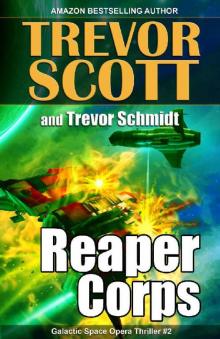 Reaper Corps
Reaper Corps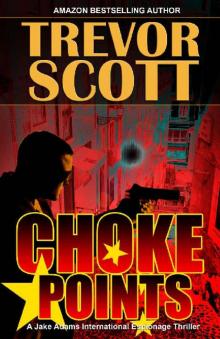 Choke Points
Choke Points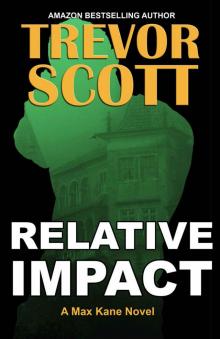 Relative Impact
Relative Impact![[Jake Adams 01.0] Fatal Network Read online](http://i1.bookreadfree.com/i/03/20/jake_adams_01_0_fatal_network_preview.jpg) [Jake Adams 01.0] Fatal Network
[Jake Adams 01.0] Fatal Network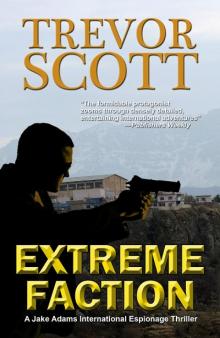 Extreme Faction
Extreme Faction The Hobgoblin of the Redwoods
The Hobgoblin of the Redwoods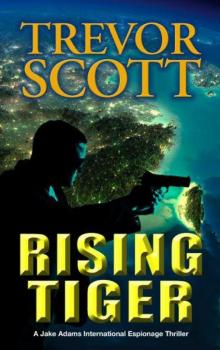 Rising Tiger
Rising Tiger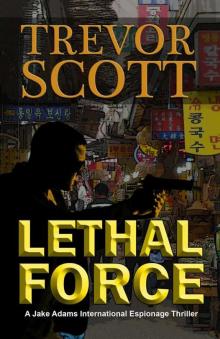 Lethal Force
Lethal Force Quantum Trigger
Quantum Trigger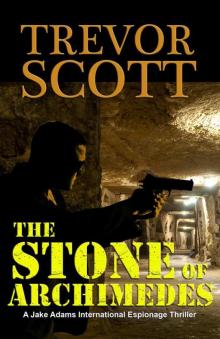 The Stone of Archimedes
The Stone of Archimedes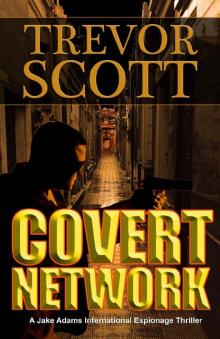 Covert Network (A Jake Adams International Espionage Thriller Series Book 14)
Covert Network (A Jake Adams International Espionage Thriller Series Book 14) Caruso 01 - Boom Town
Caruso 01 - Boom Town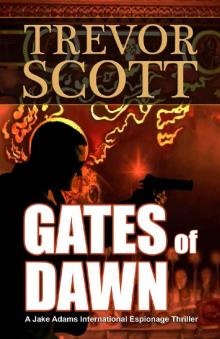 Gates of Dawn (A Jake Adams International Espionage Thriller Series Book 12)
Gates of Dawn (A Jake Adams International Espionage Thriller Series Book 12)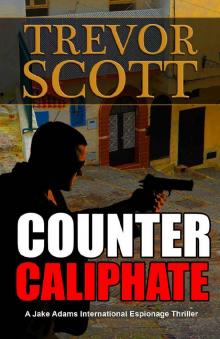 Counter Caliphate (A Jake Adams International Espionage Thriller Series Book 11)
Counter Caliphate (A Jake Adams International Espionage Thriller Series Book 11)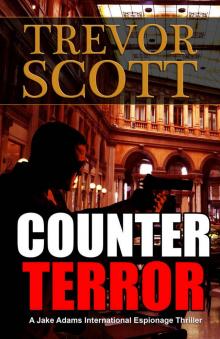 Counter Terror (A Jake Adams International Espionage Thriller Series Book 13)
Counter Terror (A Jake Adams International Espionage Thriller Series Book 13)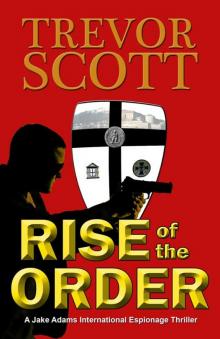 Rise of the Order
Rise of the Order Fatal Accord
Fatal Accord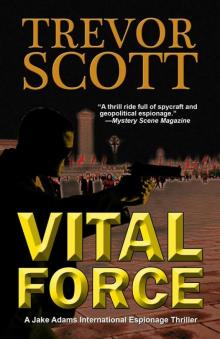 Vital Force
Vital Force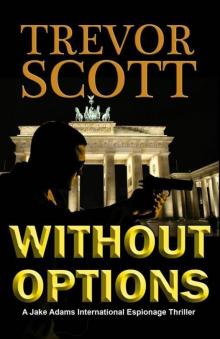 Without Options
Without Options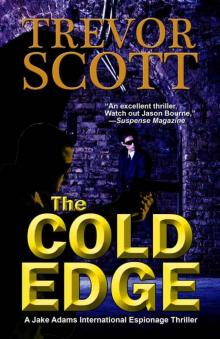 The Cold Edge
The Cold Edge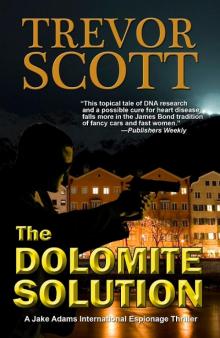 The Dolomite Solution
The Dolomite Solution Cantina Valley (A Ben Adler Mystery Book 1)
Cantina Valley (A Ben Adler Mystery Book 1) Fatal Network
Fatal Network